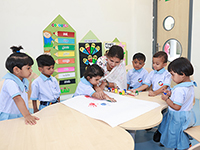What is the best study time?
Students might have new goals and study strategies when schools start their academic year. In order to significantly impact academic performance, they must optimise their study time.
But does studying in the morning work better or at night?
OR
Is it best to glance when students return from school or before leaving home the following day?
These might be some of the burning questions that children seeking peak alertness and productivity may have. This blog covers the basics of the best study time backed with scientific surveys.
Understanding Your Body Clock
Each person has a different circadian rhythm. To know if one is a morning lark or night owl, experiment with studying at different times of the day for a week. To assess the best study time, here are a few parameters that students can use to choose the best time:
- Heightened concentration
- Quick comprehension
- Energised body and min
- Calm environment
- High alertness
- Minimal interruptions
When students find a time that meets the conditions mentioned above, these hours of the day are when their cognitive abilities are at their highest. This leads to higher efficiency and yields students their desired academic results.

Science-Backed Strategies for Optimal Study Timing
There is no one-size-fits-all answer regarding the best study time, as it can vary for each individual. Nevertheless, research has shown that the brain is most alert and capable of understanding between 10 am-2 pm and 4 pm-10 pm (Amber student). To maximise attention span and engage in deep learning, it’s suggested that students should study between 4 am and 7 am.
Let’s take a look at some of the most popular study times, according to experts:
Robin Sharma, a celebrated leadership expert, in his book 5 Am Club, suggests anyone passionate about studying, working, or even building a company wake up at 5 am to complete a set of 20/20/20s – 20 mins to exercise, self-reflection and personal growth(through studying and working towards one’s goals). Many renowned personalities like Michelle Obama and Tim Cook (CEO of Apple) have adopted this routine, finding it an effective way to improve productivity and start the day with a clear, focused mind.
Thomas Frank, known for his productivity, says the best time of day varies for each person. He recommends creating a system to track energy levels to find an individual’s biological prime time. Here’s a spreadsheet and an article by Frank that helps students determine their peak time in a day.
Beyond Science: Personalise Your Study Schedule
So far, we’ve discussed how students need to identify or choose a time experts recommend to learn and comprehend to the fullest. Moreover, what yields the best results is to recall and note what has worked best for you all this time and repeat that schedule.
Students can also create a study timetable that covers concepts and subjects to be covered for the week, an estimate of assignments to finish, and the best way to make time for extra reading. Incorporating breaks and leisure activities into this timetable is crucial, as regular intervals help maintain focus and prevent burnout.
Additionally, setting specific, achievable goals for each study session can significantly enhance productivity. To establish clear objectives, rather than setting a broad goal like “study maths,” it’s more effective to aim for something more specific, such as “complete five algebra problems and review chapter 3 notes.” Students should also utilise various study tools like flashcards, apps, and online resources to enrich their learning. Engaging in study groups can provide diverse perspectives and facilitate clarification through peer discussions.
Read More: The Benefits of Education for Sustainable Development
Maximise Your Study Time at GIIS Nagpur
At GIIS Nagpur, one of the top CBSE schools in Nagpur, our children enjoy an organised study schedule and access to a wide range of resources, such as libraries, online tools, and computer labs. Being one of the best CBSE schools in Nagpur, our teachers offer precise instructions, involve students through interactive teaching methods, and provide consistent feedback.
Practical implementation of classroom learning is highlighted through workshops, school clubs, and enrichment programs. Furthermore, webinar series from international universities help broaden students’ perspectives. Active classroom participation, including discussions and hands-on activities, maintaining quiet classrooms and limited use of electronic devices, ensures students can effectively maximise their study time and achieve their academic goals.



































